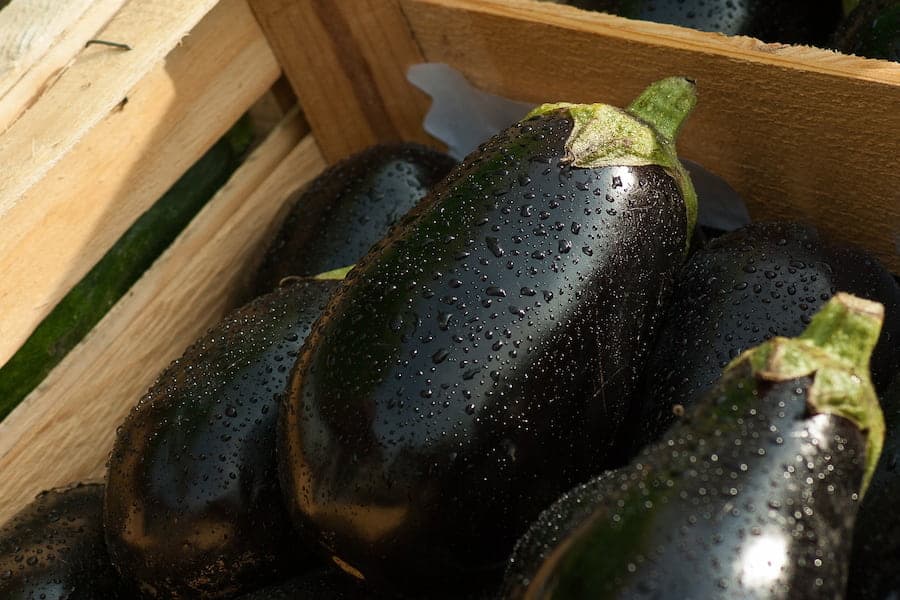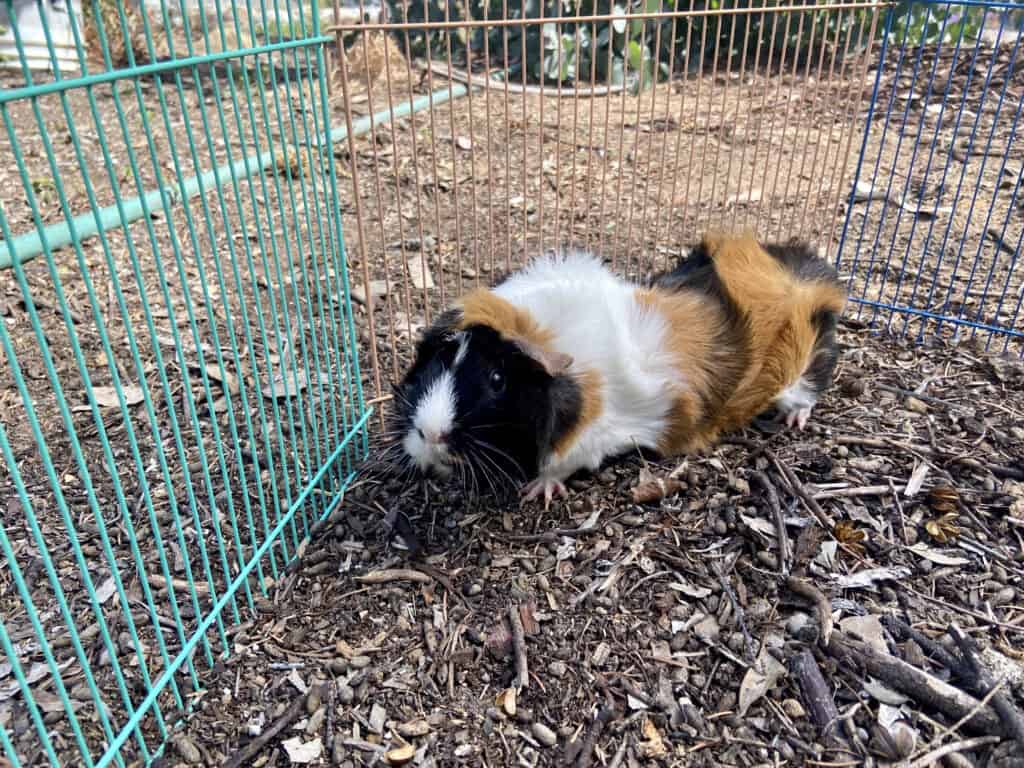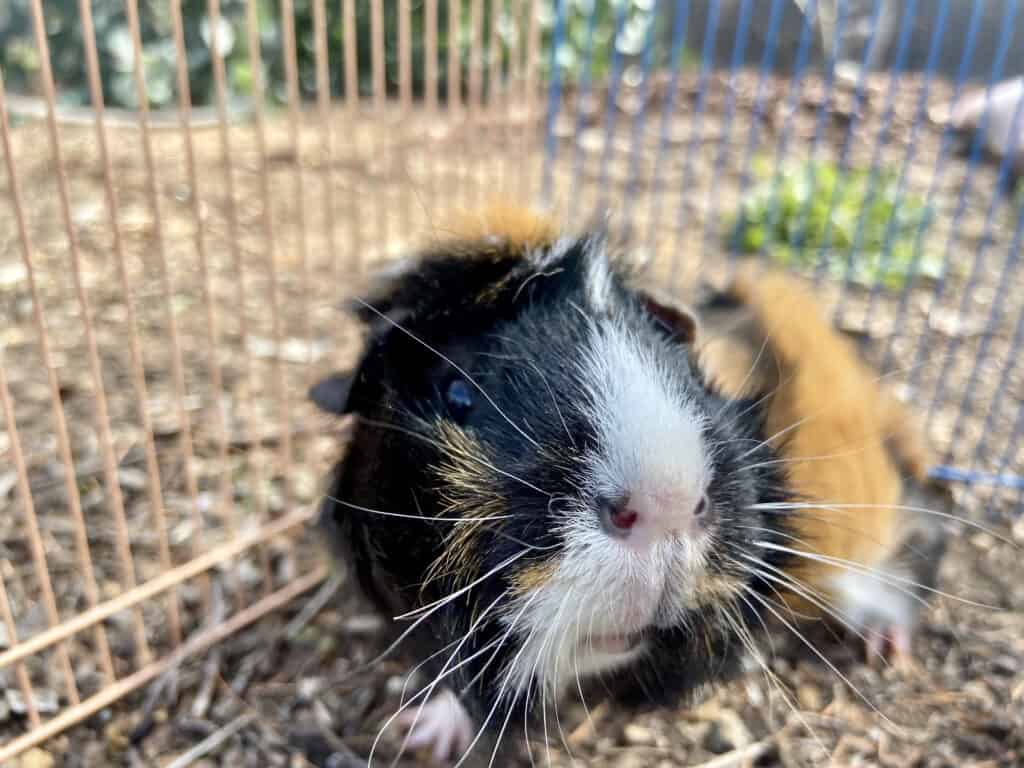As an Amazon Associate we earn from qualifying purchases.
Eggplants, also known as aubergines, are among the most popular vegetables for both human and pet consumption. They’re famous because they contain numerous nutrients and minerals beneficial to guinea pigs. However, we need to ask a very pertinent question; can guinea pigs eat eggplant?
Can Guinea Pigs Eat Eggplant?
Yes, guinea pigs can eat eggplant. However, it’s best to give eggplants to your guinea pig in moderate amounts to prevent any toxic chemicals present in eggplant from harming your guinea pig. Overall, eggplant is a really good source of nutrients for your guinea pig.

Benefits of Eggplant for Your Guinea Pig
Eggplant provides a delicious treat for your guinea pig, providing various benefits to your cavy such as:
Promoting Healthy Bone Structure
Eggplant contains a good amount of manganese, specifically making up 11% (0.232 mg per 100g) of the whole eggplant. Manganese assists in keeping the bones of your guinea pig healthy by assisting the body in the digestion of calcium and vitamin D.
Providing Dietary Fiber
With an abundance of dietary fiber, eggplant assists in the maintenance of your guinea pig’s weight by reducing the levels of cholesterol and fat in the bloodstream. Insoluble fiber helps promote regular bowel movements, preventing constipation and stomach discomfort.
Bettering Heart Health
Feeding your guinea pig eggplant helps in promoting its heart’s health.
- Eggplant contains vital nutrients such as vitamin B6 that act as an antioxidant. Vitamin B6 assists in lowering the risk of contracting heart disease.
- Eggplant also contains fiber, which reduces cholesterol levels and helps reduce the risk of heart failure and diseases.
Preventing the Growth of Cancers
Eggplant contains polyphenols that assist in the prevention of the growth of cancerous cells. Polyphenols can help your guinea pig by hindering the growth and expansion of tumors and cancerous cells. Anthocyanins assist in the prevention of cancer by stimulating autophagy (suicide) of cancerous cells.
Providing Necessary Antioxidants
Eggplant contains effective antioxidants such as flavonoids, nasunin, lutein, and zeaxanthin. These antioxidants help in the binding of free radicals present in the bloodstream. Free radicals’ binding and expulsion help promote healthy skin, eyesight, and eye health and prevent rampant inflammation.

Risks Associated With Feeding Eggplants to a Guinea Pig
Despite all the benefits, you should also be wary of these risks before adding eggplant to your guinea pig’s diet:
Eggplants Don’t Have Enough Vitamin C
Eggplant contains a small amount of vitamin C (around 2.2mg per 100g). This level of vitamin C is way below the threshold that your guinea pig requires per day (10-30 mg). Such a deficiency in vitamin C may make your cavy susceptible to diseases, the most notable of which is scurvy. Scurvy causes diarrhea, internal bleeding, dental issues, and weight loss.
Considering mixing eggplants with foods that are rich in Vitamin C are blackberries, fresh limes, and mangoes that you can feed to your guinea pigs.
Eggplants Upsets Guinea Pigs’ Stomaches
Sugar constitutes a significant part of eggplant (3.53 g/ 100 g). However, the sugar amount poses a significant issue for guinea pigs. Guinea pigs’ stomachs find it difficult to digest sugar or glucose. This difficulty manifests as the development of diarrhea and painful stomach aches.
Eggplants Can Lead to Allergies and Acute Side Effects
The introduction of eggplant into your guinea pig’s diet can introduce some complications in the case of allergies. These allergies may express themselves in the form of rashes and stomach aches. If this happens, it may be best to withdraw eggplant from the diet of your guinea pig altogether.
Something to note when giving eggplants to your guinea pig is that eggplant belongs to a group of plants called nightshades. Nightshades are known to have alkaloids and, in the case of eggplant, solanine. Solanine is particularly toxic to guinea toxics as it is known to cause hemorrhaging and swelling of internal organs. Other symptoms of solanine poisoning include vomiting and diarrhea.
How to Feed Eggplant to a Guinea Pig
The process of preparing and feeding an eggplant to your guinea pig is a fairly simple one. However, there are a few precautions you need to take to ensure the safety and health of your guinea pig.
It would be best for you to look for an edible, fresh, organic, and ripe eggplant distinguished by its purple color. Ensure the eggplant is not contaminated by harmful chemicals such as pesticides and herbicides.
After cleaning the eggplant, cut away the green parts, such as the cap, flower, and leaves, as they contain solanine which is toxic, as we have established.

To ensure edibility, cut the eggplant into small chunks that your cavy can comfortably eat. Take note that you should feed eggplant to your guinea pigs at most twice per week.
Related Questions
Can You Feed an Eggplant Stalk to Guinea Pigs?
No, it would be best if you did not feed eggplant stalks to a guinea pig. These stalks contain solanine, a toxic substance to guinea pigs. Solanine is also present in the flowers and leaves at toxic levels. Ingestion of these parts might lead to a painful death for your cavy.
What Foods Can Guinea Pigs Not Eat?
There is quite an extensive list of foods and treats that you should never feed to your guinea pig as they may cause severe adverse side effects. These foods include:
- Mushrooms
- Onions
- Garlic
- Potatoes
- Iceberg lettuce
- Avocados
- Chocolate
- Rhubarb
- Nuts
Conclusion
Eggplant provides some nutritional value for you to feed your guinea pig. However, it would help to exercise moderation and caution when feeding eggplant to your guinea pig to prevent poisoning.